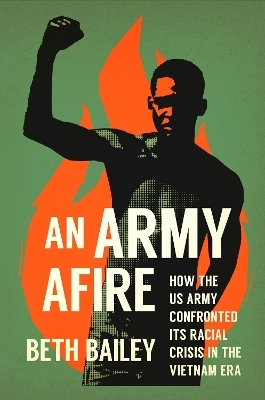
An Army Afire
How the US Army Confronted Its Racial Crisis in the Vietnam Era
Seiten
2023
The University of North Carolina Press (Verlag)
978-1-4696-7326-4 (ISBN)
The University of North Carolina Press (Verlag)
978-1-4696-7326-4 (ISBN)
Acclaimed military historian Beth Bailey shows how the US Army experienced, defined, and tried to solve racism and racial tension (in its own words, ‘the problem of race’) in the Vietnam War era.
By the Tet Offensive in early 1968, what had been widely heralded as the best qualified, best-trained army in US history was descending into crisis as the Vietnam War raged without end. Morale was tanking. AWOL rates were rising. And in August of that year, a group of Black soldiers seized control of the infamous Long Binh Jail, burned buildings, and beat a white inmate to death with a shovel. The days of "same mud, same blood" were over, and by the end of the decade, a new generation of Black GIs had decisively rejected the slights and institutional racism their forefathers had endured.
Acclaimed military historian Beth Bailey shows how the Army experienced, defined, and tried to solve racism and racial tension (in its own words, "the problem of race") in the Vietnam War era. Some individuals were sympathetic to the problem but offered solutions that were more performative than transformational, while others proposed remedies that were antithetical to the army's fundamental principles of discipline, order, hierarchy, and authority. Bailey traces a frustrating yet fascinating arc where the army initially rushed to create solutions without taking the time to fully identify the origins, causes, and proliferation of racial tension. It was a difficult, messy process, but only after Army leaders ceased viewing the issue as a Black issue and accepted their own roles in contributing to the problem did change become possible.
By the Tet Offensive in early 1968, what had been widely heralded as the best qualified, best-trained army in US history was descending into crisis as the Vietnam War raged without end. Morale was tanking. AWOL rates were rising. And in August of that year, a group of Black soldiers seized control of the infamous Long Binh Jail, burned buildings, and beat a white inmate to death with a shovel. The days of "same mud, same blood" were over, and by the end of the decade, a new generation of Black GIs had decisively rejected the slights and institutional racism their forefathers had endured.
Acclaimed military historian Beth Bailey shows how the Army experienced, defined, and tried to solve racism and racial tension (in its own words, "the problem of race") in the Vietnam War era. Some individuals were sympathetic to the problem but offered solutions that were more performative than transformational, while others proposed remedies that were antithetical to the army's fundamental principles of discipline, order, hierarchy, and authority. Bailey traces a frustrating yet fascinating arc where the army initially rushed to create solutions without taking the time to fully identify the origins, causes, and proliferation of racial tension. It was a difficult, messy process, but only after Army leaders ceased viewing the issue as a Black issue and accepted their own roles in contributing to the problem did change become possible.
Beth Bailey is a Foundation Distinguished Professor of History at the University of Kansas.
| Erscheinungsdatum | 18.03.2023 |
|---|---|
| Zusatzinfo | 19 halftones 19 |
| Verlagsort | Chapel Hill |
| Sprache | englisch |
| Maße | 155 x 235 mm |
| Gewicht | 317 g |
| Themenwelt | Geisteswissenschaften ► Geschichte ► Regional- / Ländergeschichte |
| Geschichte ► Teilgebiete der Geschichte ► Militärgeschichte | |
| Sozialwissenschaften ► Ethnologie | |
| Sozialwissenschaften ► Soziologie | |
| ISBN-10 | 1-4696-7326-6 / 1469673266 |
| ISBN-13 | 978-1-4696-7326-4 / 9781469673264 |
| Zustand | Neuware |
| Haben Sie eine Frage zum Produkt? |
Mehr entdecken
aus dem Bereich
aus dem Bereich
neueste Manipulationstechniken als Waffengattung der NATO
Buch | Softcover (2023)
Westend (Verlag)
24,00 €
Deutschlands Schwäche in der Zeitenwende
Buch | Softcover (2023)
C.H.Beck (Verlag)
18,00 €


